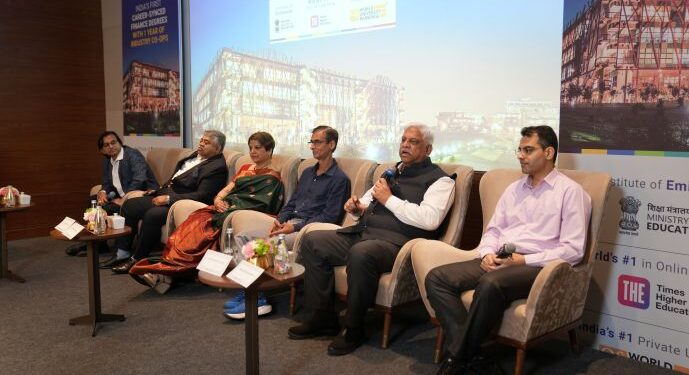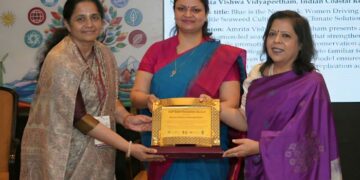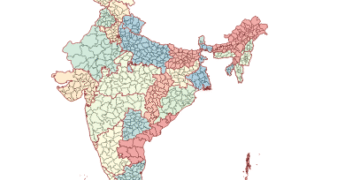O.P. Jindal Global University (JGU) – a non-profit, multi-disciplinary and research-oriented Institute of Eminence has launched the country’s first Co-op Bachelor’s Degree program designed to equip students with a full year of real-world work experience even before they graduate. These programs will be offered by the Jindal School of Banking & Finance.
Designed for Class 12 graduates from science or humanities backgrounds, the 3-year program goes beyond traditional classroom learning, offering three cutting-edge specialisations: a) AI & Finance, b) Finance & Entrepreneurship, and c) International Accounting & Finance, the latter being aligned with the globally recognised ACCA pathway.
Built around the growing demand for tech-savvy finance professionals, each specialisation integrates AI and emerging technology coursework with deep domain knowledge to prepare students for next-generation roles in FinTech, Consulting, Startups, and Global Finance.
The announcement was made at an industry-academia event hosted in Mumbai, attended by prominent leaders from the education, higher academia, and technology ecosystem.
The program’s unique 4+4+4 model – 4 months online learning, 4 months on-campus immersion, and 4 months of on-the-job training, ensures students graduate with hands-on experience, industry exposure, and academic credits that exceed traditional degrees. The program is powered by upGrad as its official technology and learning enablement partner, ensuring high-quality delivery at scale, enhanced access, and industry-aligned digital infrastructure to support student success across geographies. The rigorous yet flexible academic program structure and credits provide a smoother pathway to premier higher education in India and globally.
The future of education must be deeply integrated with the future of work,” said Dr Hemant Manuj, Executive Dean, Jindal School of Banking & Finance, speaking at the event. “Traditional learning models were designed for a world that no longer exists. Today’s industries demand adaptability, cross-functional skills, and real-world experience. This program is not just a curriculum innovation – it’s a systemic intervention to prepare students for the future from Day 1.”
Despite India’s high graduate output, employability remains a major concern, especially in tech-driven domains like finance and AI. JGU’s Co-op Bachelor’s model addresses this head-on – offering one full year of integrated industry experience to ensure graduates are job-ready for today and tomorrow’s jobs.
The Finance & Entrepreneurship track encourages students to build their own ventures, even allowing them to pursue Co-op / Blended internships within their startups.
The university is inviting enrolments, and the first cohort is set to commence in September this year: https://rb.gy/v3b779
The event aimed at initiating conversations around agile curriculum and the future of employability, featured an insightful panel discussion titled “The Need for Co-op Blended Bachelor’s Degrees”. The discussions addressed the pressing skill deficit across finance and technology sectors, the evolving expectations of global employers, and the urgent need to rethink traditional degree formats to better align with the World Economic Forum’s Future of Jobs Report 2025 and the Top 10 Skills that are Expected to Grow Fastest by 2030.
Distinguished speakers included Mr Abhimanyu Basu, Dean & CEO, Dhirubhai Ambani International School, Dr Hemant Manuj, Professor and Executive Dean, Jindal School of Banking & Finance, OP Jindal Global University, Dr. Vandana Lulla, Director Principal, Podar Group of Schools (Cambridge & IB), Lt. Gen. Surendra Kulkarni, Secretary General & Former Director, Mayo College, Dr Rupesh Sharma, Assistant Professor, Jindal School of Banking & Finance, and Murari Ramuka, AI & Technology Strategist, Microsoft – moderated by the Leading Career & College Counselor, Mr. Himanshu Dev.
Commenting on the evolving education landscape Mr Murari Ramuka of Microsoft said, “AI is revolutionizing education & Industries, unlocking unprecedented opportunities for personalized learning and profound exploration. It’s imperative that courses should integrate AI into their curriculum, ensuring students are equipped not just with domain knowledge, but also with an understanding of emerging trends. Coupling this with real-world internship experience is essential to prepare learners for the next generation of roles in an increasingly AI-driven world.”












